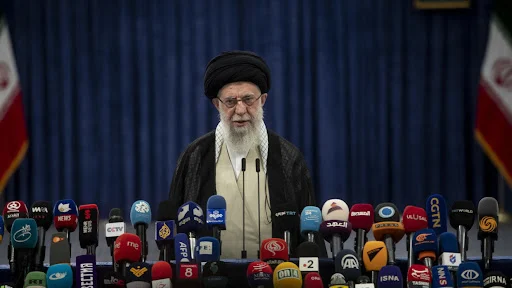In a fiery response to U.S. President Donald Trump’s recent ultimatum, Iran’s Supreme Leader Ayatollah Ali Khamenei has issued a stark warning, declaring that any U.S. military intervention would inflict “irreparable damage” on American interests. The escalating war of words comes as tensions in the Middle East reach a boiling point, with Iran firmly rejecting Trump’s demands for compliance and signaling its unwavering resolve to resist external pressure.
Trump’s warning, delivered earlier this week, threatened devastating strikes on Iran if it targets U.S. assets, bluntly stating that Iran’s leadership would be an “easy target.” The provocative remarks followed reports of heightened U.S. military presence in the region, prompted by intelligence suggesting potential Iranian retaliation for recent Israeli airstrikes on Iranian military facilities. The strikes, which damaged key infrastructure, have been a flashpoint, with Khamenei accusing Washington of orchestrating and supporting Israel’s actions to weaken Iran’s regional influence.
Speaking to a gathering of military officials and state media in Tehran, Khamenei dismissed Trump’s threats as “empty rhetoric” designed to intimidate. “The United States seeks to impose its will through fear, but Iran will never surrender,” he declared, emphasizing that any attempt to enforce a so-called “imposed peace” would be met with fierce resistance. He pointed to Iran’s advanced missile capabilities and its network of regional allies as a deterrent, warning that any miscalculation by the U.S. could ignite a broader conflict with catastrophic consequences.
The confrontation stems from a volatile mix of longstanding grievances and recent developments. Iran has accused the U.S. of violating international agreements by withdrawing from the 2015 nuclear deal and reimposing crippling sanctions. Meanwhile, Washington has intensified its “maximum pressure” campaign, aiming to curb Iran’s nuclear ambitions and its support for proxy groups across the Middle East. The Israeli strikes, which Iran claims were greenlit by the U.S., have further inflamed the situation, with Tehran vowing to respond “at a time and place of its choosing.”
Analysts warn that the rhetoric risks spiraling into a dangerous escalation. “Both sides are digging in, and the margin for de-escalation is shrinking,” said Dr. Farid Rezaei, a Middle East security expert at the University of Tehran. “Khamenei’s defiance is a signal to both domestic and regional audiences that Iran won’t bow to pressure, but it also raises the stakes for missteps.”
As the region braces for potential fallout, Khamenei reiterated Iran’s commitment to its “axis of resistance,” including allies like Hezbollah and Syrian forces, while accusing the U.S. of destabilizing the Middle East through its support for Israel and Saudi Arabia. “The American regime speaks of peace but fuels war,” he said, urging unity among Iran’s allies to counter external threats.
With both leaders standing their ground, the international community watches anxiously, aware that a single miscalculation could tip the region into chaos. For now, Iran remains defiant, and the specter of conflict looms large.
Tags
International

